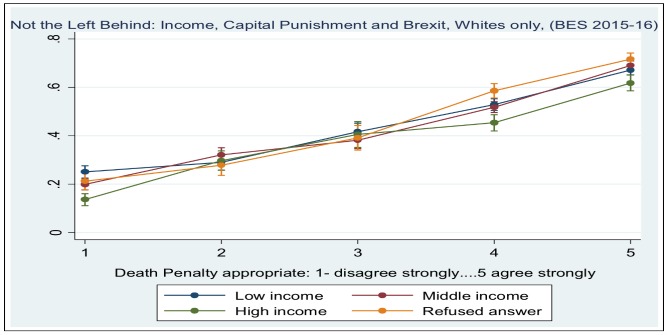 While migrants’ fiscal contributions could make up for the increased demand on public services, these are currently being used for other purposes, writes Johnny Runge. As a result many people continue to assume that migration is a drain to the economy and to public services.
While migrants’ fiscal contributions could make up for the increased demand on public services, these are currently being used for other purposes, writes Johnny Runge. As a result many people continue to assume that migration is a drain to the economy and to public services.
EU migrants contribute positively to UK public finances. According to recent research, they pay more into the system through taxes than what they take out by using public services and receiving benefits. Furthermore, EU migrants’ contributions over their entire lifetime are usually much higher than those of natives, partly because most migrants arrive fully educated and many leave before the cost of retirement and old-age starts to weigh on public finances.
Still, the public’s opposition to EU migration is driven, in large part, by economic factors, often focused on migrants’ use of state funds, welfare and public services such as the NHS and schools. While the British public has become increasingly positive about the overall economic impact of EU immigration since the EU referendum in 2016, the same opinion polls still show that a substantial part of the population think migration has had a negative economic impact.
So why do experts and parts of the public view economic impacts of EU immigration so differently? One explanation could be that the public’s economic concerns are centred around low-skilled EU migrants rather than the aggregate effect. Indeed, a recent study found that low-skilled migrants contribute less to public finances than high-skilled migrants. But their contribution was still positive, and this is before accounting for the fact that low-skilled migrants often fill important shortages in the labour market.
Another explanation would be that parts of the public are simply ignorant of EU immigrants’ positive impact on public finances, or that their judgement is biased by other considerations. For example, those who oppose immigration for cultural reasons may simply be choosing to ignore or reject the economic facts. But it’s also possible that the public are simply looking at the issue from a different perspective, and that this is view is as informative as the perspective of experts.
Recent NIESR and British Future research found that people operate with a hierarchy of evidence. People tend to trust local and personal experiences including what they hear from friends, family and colleagues, more than narratives from experts and the media.
So, what have their personal experiences been? The rise in net EU migration since 2004 has coincided with an economic downturn, followed by a decade of austerity including deterioration of public services and cuts to welfare. Quite understandably, parts of the public have connected this rise in net migration with their perception that living standards have declined.
Of course, experts would take care not to mistake correlation for causation. They would argue that any deterioration in living standards has resulted from recession and government austerity policies rather than the impact of EU migration. But even if the public’s economic concerns about EU migration are not statistically bullet-proof, the reality is that the government has neglected to respond to population increases, which have resulted in part from higher net EU immigration.
The fact that migrants’ fiscal contributions could, in principle, make up for the increased demand on public services ‘is not so much comfort in practice if those revenues are in fact being allocated elsewhere, for tax cuts or deficit reduction, as in fact has been the case,’ argues Professor Jonathan Portes.
The Migration Advisory Committee, an independent body that advices the government on migration issues, recognised this back in 2012. In a much overlooked part of their recent report, written to inform future immigration policy, they explore whether the allocation of public funding has allowed money to flow to areas where migration has increased the demand for public services.
They found that migration only makes a few direct appearances in the funding formulae, including by adjusting school funding to take account of numbers of pupils who speak English as an Additional Language. They concluded that the existing funding formulas are ‘very complicated’ and that ‘…we are not convinced sufficient attention is paid to [this issue].’
Faced with this absence of information on how national funds find their way to parts of the UK, people are understandably sceptical about statements that migrants put more into the economy than they take out. Instead, they rely on personal judgements. As our NIESR research found, conveying evidence on the fiscal contribution of migrants with a ‘produced by experts’ label lacks appeal compared to a simpler explanation based on personal experiences.
The design of a new, post-Brexit immigration system is an opportunity to address public concerns, yet the White Paper proposals contain no considerations about how migration funding is distributed. Given the role of immigration in the Leave vote and the tensions it exposed, it is crucial to address the widespread assumption that migration is a drain to the economy and to public services rather than a benefit. Otherwise, the public and experts will keep talking at cross-purposes on the impacts of immigration.
_____________
 Johnny Runge (@JohnnyRunge) is a Social Researcher at the National Institute of Economic and Social Research (NIESR).
Johnny Runge (@JohnnyRunge) is a Social Researcher at the National Institute of Economic and Social Research (NIESR).
All articles posted on this blog give the views of the author(s), and not the position of LSE British Politics and Policy, nor of the London School of Economics and Political Science. Featured image: Pixabay (Public Domain).








Many migrants understandably find it upsetting to be viewed merely as an economic contributor: it makes some of them feel that they are only tolerated if they contribute, and at risk of being booted out of the country when they become old or sick.
That aside, much of the argument driving Brexit was the “controlling our borders” rhetoric; which was mostly used as a euphemism for keeping foreigners out. (This seems to be the primary motivating factor for Theresa May as Home Secretary, and subsequently in setting her red lines for Brexit negotiations – Freedom of Movement Must End!)
So many Brexit voters quoted anecdotes about austerity and bad-planning – the lack of places in schools; the difficulty getting a GP or hospital appointment, and so on; and blamed immigrants. There are too many of them, taking all the places in the local school; ahead of you in the queue for treatment….
We know, however, that immigrants (particularly EU residents in the UK – although that’s partly at least due to demographics) contribute more to the economy, on average, than natives; so they contribute more to schools and the NHS. If there’s still a school or GP surgery in your area, it’s in part because immigrants’ contributtons are paying for it.
But the narrative in the tabloid (and some broadsheet) papers, and the lack of an explanation of these economic facts means that the idea – which does have face-validity, although its false – that migrants are using up all the resources – has taken hold in many people.
And politicians have often found it easier to nod along than to challenge it. Why risk your seat trying to explain how the world works, when your voters “know” they’re right (even when they aren’t) and will punish you (by voting for somebody else) if they hear something they don’t accept?
Too many people believe in Schrödinger’s migrant – simultaneously living off benefits (which you pay for) while stealing your job.
I am grateful to this article as another piece of evidence to use to convice at least a few people otherwise.
Isn’t there an easier way to refute public concerns. After all the essential point about a service-user is not that they are an immigrant but that they are a person.
Many local services are funded on a weighted capitation basis. Simplifying, another child goes to a local school, the school gets another cheque whether the child is English or Polish. GPs are funded by the number of patients on their register.
The problem has not been the allocation of public funds to local services, but that funding per head has been too low
(English as an Additional Language is a lousy indicator for what it is being used for. It tests whether another language is spoken, not whether the child can speak English well or badly. So it treats children who are fluent in two languages as having difficulties with English; and it ignores monoglot English speakers who speak the language badly)
https://www.london4europe.co.uk/immigrants_fund_local_services
Dear Johnny
Unfortunately I found your article to be misleading and lacking substance
You are correct to say that at a headline level EU immigration contributes more to the UK state than it takes out
However this is simplified calculation and an average that belies the data beneath
As you well know from the MAC Report net contribution to the UK state begins at £30,000 income
The 350,000+ EU migrants claiming Tax Credits from the UK state at around £4 billion a year that are most certainly not net contributors to the UK
You fail to mention in your analysis exactly what % of EU migrants achieve the £30,000 threshold ?
As with the UK population as a whole there are more that fail to achieve this benchmark than actually exceed it
Likewise there are 1.4 million UK unemployed and 5 million claiming Tax Credits (18 hours a week full time)
The UK has plenty of labour capacity and does not need cheap unskilled EU migrants
Qualified professionals in areas of shortage is a completely different matter
Indeed am I right to believe that you are proposing that 3 million immigration every 10 years for 2% GDP growth is a sustainable social model ?
Your post would benefit from a more in depth study of the readily available facts and a more balanced presentation of both sides of the argument
Kind regards
Martin Godfrey